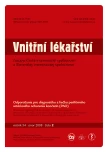-
Medical journals
- Career
The scintigraphic 99mTc-MAA imaging quantification of the right-to-left shunt in a patients with multiple pulmonary arteriovenous malformation and familial teleangiectasis
Authors: J. Doležal
Authors‘ workplace: Oddělení nukleární medicíny Lékařské fakulty UK a FN Hradec Králové, přednosta prim. MUDr. Ing. Jaroslav Vižďa
Published in: Vnitř Lék 2008; 54(2): 206-209
Category: Case Report
Overview
Aim:
To present a case report about 57-years-old woman with hypoxemia, multiple pulmonary arteriovenous (AV) malformations and lips teleangiectasis where the right-to-left shunt quantification was assessed by means of whole body scintigraphy with 99mTc-labelled human macro-aggregated albumin (MAA).Material and Method:
A 57-years-old woman underwent X-ray and bolus enhanced lung CT for dyspnoea, hypoxemia and cyanosis. A multiple intrapulmonary arteriovenous malformations were detected. The whole-body 99mTc-MAA scintigraphy for the right-to-left shunt quantification was performed. The whole-body scintigraphy in anterior and posterior view was started after intravenous application of 185 MBq 99mTc-MAA. The double-head gamma camera Infinia (General Electric Medical Systems - GE MS) with infrared body countouring and the large field of view was used. The Gamma camera was fitted with low-energy, high resolution, parallel-hole collimator. Images were evaluated by processing system Xeleris (GE MS).Results:
The whole-body 99mTc-MAA scintigraphy revealed significant R-L shunt and uptake of radiotracer in extrapulmonary organs (brain, kidney, spleen). The right-to-left shunt ratio was 36 %. The woman underwent successful percutaneous transcatheter microembolization treatment. After treatment the woman underwent the next 99mTc-MAA whole-body scintigraphy and the R-L shunt ratio decreased to 17 %.Conclusion:
The 99mTc-MAA whole-body scintigraphy assessed the right-to-left shunt ratio and improved the management of patients with multiple intrapulmonary A-V malformations. The next 99mTc-MAA scintigraphy after the percutaneous transcatheter microembolization of multiple intrapulmonary A-V malformations confirmed success of treatment.Key words:
R-L shunt - multiple intrapulmonary arteriovenous malformations - whole-body 99mTc-MAA scintigraphy
Sources
1. Buncová M, Málek I. Pravolevý zkrat při perfúzní scintigrafii plic 99mTc-MAA. Čes Radiol 2002; 56 : 299-302.
2. Gupta P, Mordin C, Curtis J et al. Pulmonary arteriovenous malformations: effect of embolization on right-to-left shunt, hypoxemia, and exercise tolerance in 66 patients. Am J Roentgenol 2002; 179 : 347-355.
3. Hušák V, Petrová K et al. Aplikované aktivity radiofarmak, radiační zátěž a radiační riziko vyšetřovacích postupů v nukleární medicíně. Čas Lék Čes 1999; 138 : 323-328.
4. Klener P et al. Vnitřní lékařství. Praha: Galén 1999 : 389.
5. Lu G, Shih WJ, Chou C et al. Tc-99m MAA total-body imaging to detect intrapulmonary right-to-left shunts and to evaluate the therapeutic effect in pulmonary arteriovenous shunts. Clin Nucl Med 1996; 21 : 197-202.
6. Mysliveček M, Hušák V, Koranda P. Nukleární medicína. Olomouc: Vydavatelství Univerzity Palackého 1995: vol. 1, 102-104.
7. Sandler MP, Coleman RE, Patton JA et al. Diagnostic Nuclear Medicine. 4thed. Philadelphia: Lippincott Williams Wilkins 2003 : 1172-1173.
8. Sugiyama M, Sakahara H, Igarashi T et al. Scintigraphic evaluation of small pulmonary right-to-left shunt and therapeutic effect in pulmonary arteriovenous malformation. Clin Nucl Med 2001; 26 : 757-760.
9. Whyte MK, Peters AM, Hughes JM et al. Quantification of right to left shunt at rest and during exercise in patients with pulmonary arteriovenous malformation. Thorax 1992; 47 : 790-796.
Labels
Diabetology Endocrinology Internal medicine
Article was published inInternal Medicine

2008 Issue 2-
All articles in this issue
- Monitoring of anti-tumour cell-mediated response in patients with renal cell carcinoma, disturbance of T cell proliferation
- Definition of 24hour ambulatory blood pressure values corresponding to office blood pressure values of 130/80 mm Hg
- Factors related to NT-proBNP values in haemodynamically stable patients with normal systolic function of the left ventricle
- Invasive aspergillosis in hematooncological patients: advantages and disadvantages of various diagnostic methods, treatment options and financial costs of therapy
- Dyslipidaemia inducted by antiretroviral agents
- Blood vessel reconstruction infections: a practical view
- Importance of the endocannabinoid system in the regulation of energy homeostasis
- Peripheral arterial disease of extremities – guidelines for diagnostic and treatment
- At least 60 deaths could be avoided in this country every day!
- The scintigraphic 99mTc-MAA imaging quantification of the right-to-left shunt in a patients with multiple pulmonary arteriovenous malformation and familial teleangiectasis
- Current Use of Magnetic Resonance Imaging in Cardiology
- Internal Medicine
- Journal archive
- Current issue
- Online only
- About the journal
Most read in this issue- Peripheral arterial disease of extremities – guidelines for diagnostic and treatment
- The scintigraphic 99mTc-MAA imaging quantification of the right-to-left shunt in a patients with multiple pulmonary arteriovenous malformation and familial teleangiectasis
- Factors related to NT-proBNP values in haemodynamically stable patients with normal systolic function of the left ventricle
- Monitoring of anti-tumour cell-mediated response in patients with renal cell carcinoma, disturbance of T cell proliferation
Login#ADS_BOTTOM_SCRIPTS#Forgotten passwordEnter the email address that you registered with. We will send you instructions on how to set a new password.
- Career

